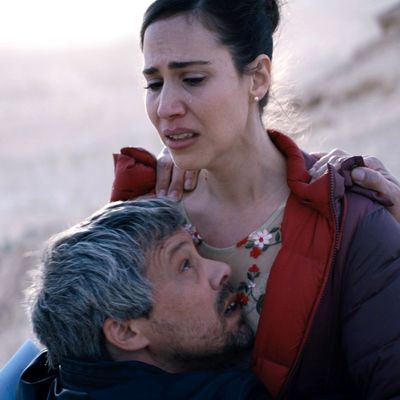
The Israeli director Nadav Lapid makes abrasive moral dramas whose stories fragment and detour in unexpected and unsettling ways. The early scenes of his latest, Ahed’s Knee, suggest that this might be his oddest, most challenging effort yet, as we watch fractured images of auditions for a film about Ahed Tamimi, a teenage Palestinian activist whose slap of an Israeli soldier went viral in 2017. Tamimi was subsequently arrested, and an Israeli member of Parliament suggested she be shot in the knee. But it turns out that Ahed’s Knee isn’t really about Ahed or her knee — at least not directly. We soon leave the audition behind and follow a hotshot, award-winning director, Y (Avshalom Pollak), as he flies to the remote, dusty Arava Valley, where an earlier film of his will screen to a small-town audience.
Here, the picture settles into what we might call a more straightforward narrative — at least, in its broad strokes. Y is met by Yahalom (Nur Fibak), a young, cheerful bureaucrat who works at the Ministry of Culture but is originally from this area. She greatly admires Y’s films and seems genuinely excited to show them to a provincial audience that doesn’t get to experience real culture all that often. A flirty camaraderie emerges between the sunny, pretty Yahalom and the older, perpetually dour, black-clad Y, who might as well have a cartoon storm cloud following him everywhere.
Almost offhandedly, Yahalom mentions that she needs Y to sign a form declaring the subject of the film he’s screening; perhaps needless to say, the politically charged subject isn’t among the many options — just another sign of the oppressiveness and censoriousness Y sees creeping into Israeli society. The document is a mere formality, but it sets him off. Not just because of the moral dilemma he faces in signing it (and, we suspect, because it reminds him of the many compromises he’s already made to become a revered artist), but also because of the paradox he senses in Yahalom, a smart, kind young woman who understands the inherent corruption behind this type of low-key censorship but nevertheless performs her job with pleasant professionalism.
That’s the emotional setup, and it’s an interesting one. But as with Lapid’s previous films Synonyms and The Kindergarten Teacher, both fine examples of the intersection of caustic style and extreme psychology, what makes Ahed’s Knee so powerful is the way the movie detonates before our eyes. The rage and doubt gnawing away at Y’s conscience spill over into an extended flashback, numerous dance sequences (one featuring young male soldiers body-slamming to Israeli rapcore from the group Shabak Samech, another featuring female soldiers gyrating with their rifles to the same — Lapid loves dissonances within dissonances), and, ultimately, a blistering monologue that practically takes the movie hostage. The camera collapses into Y’s face as he screams about the psychic decay of Israeli society, about forced frivolousness and an oppressive education system and a growing cultural poverty. Snatches of sky and looming birds and Y’s wild eyes swirl across the screen; the desert setting also adds to the effect. This is not just a rant; it is a trancelike, spittle-flecked, apocalyptic screed, delivered with the force of prophecy.
Ahed’s Knee is loosely based, much like Synonyms, on an event from Lapid’s own life, and the depressed, intense Y is clearly a stand-in for the Berlin-winning director himself. Palestinians are often absent from Lapid’s films, even though the occupation and Israel’s many wars loom over his narratives like an eternal specter, a defining absence. He’s interested in how the inescapable moral quagmire of society manifests itself in erratic behavior, and he makes erratic films to capture the psychology behind such behavior. Maybe that’s why his work regularly resonates beyond Israel.
But he also reserves perhaps the greatest condemnation for himself, for Y is no avatar of decency or rectitude himself. He’s a mess, but more than that: He’s a manipulative, duplicitous, even hypocritical mess. His fiery monologue may be terrifyingly intimate and sincere, but it’s laced with ulterior motives. So even as Ahed’s Knee opens up to deliver a filmmaker’s cri de coeur about the state of his country, it also dares to ask where goodness lies, which is a far more universal and relatable question. At what point does constant aggrievement become its own toxic form of aggression? At what point does rage become cruelty? But also: At what point does merely going about one’s business perpetuate great evil? What is the threshold for quietly participating in an oppressive system? Humanity has never had easy answers to such questions, and neither does Ahed’s Knee. And so, the movie itself shrieks, and flails, and breaks, and burns. It might be a masterpiece.
More Movie Reviews
- The Accountant 2 Can Not Be Taken Seriously
- Another Simple Favor Is So Fun, Until It Gets So Dumb
- Errol Morris Has Been Sucked Into the Gaping Maw of True Crime


